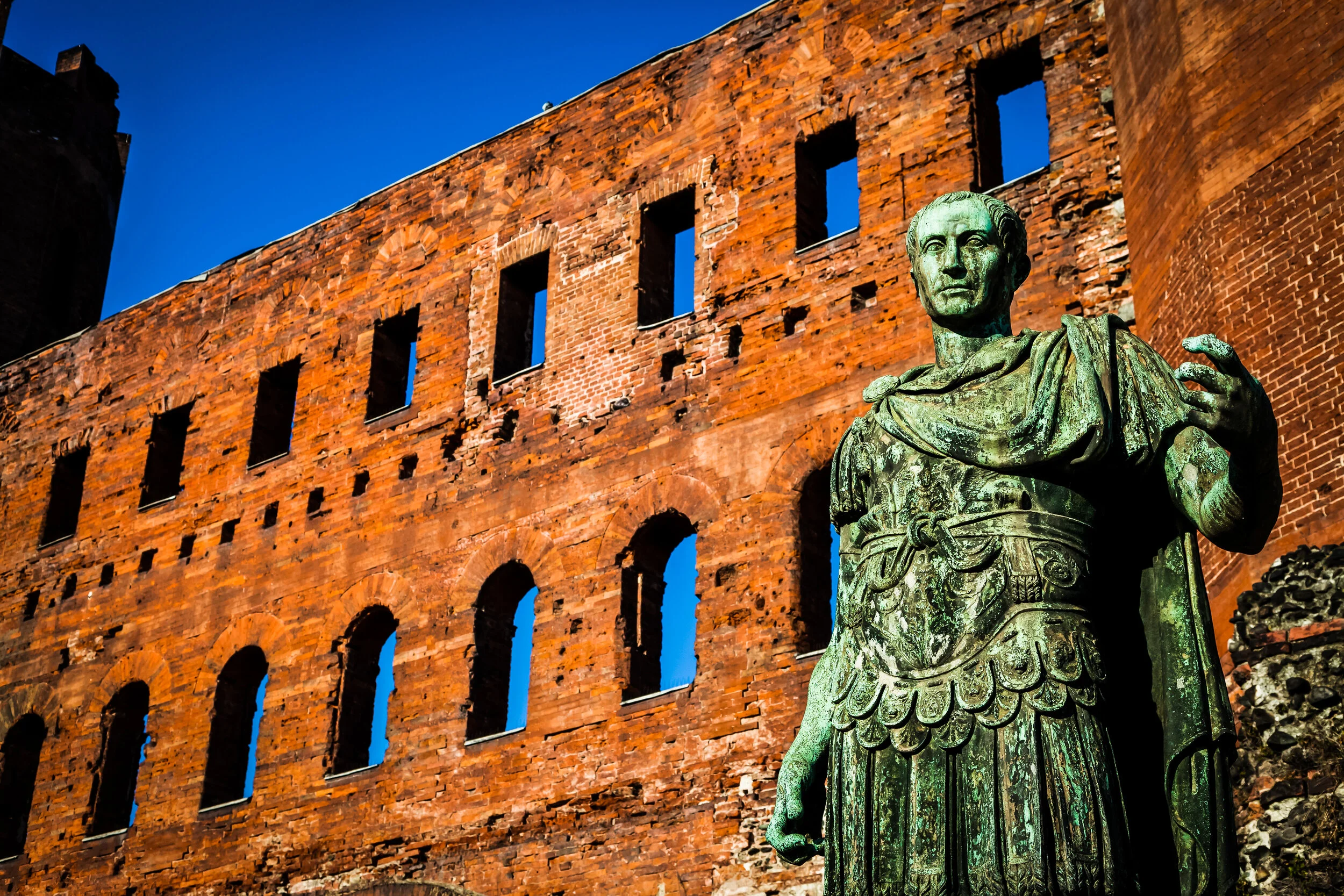Life Lessons from Julius Caesar: First Play by the Rules, Then Seize Power
Everyone knows that the man now known as “Julius Caesar” (Gaius Julius Caesar) eventually appointed himself “Dictator for Life” (dictator perpetuo), putting the final nail in the coffin of the Roman Republic. And they may also know additional facts about Julius Caesar such as the fact that he was assassinated on the Ides of March (March 15th) or that he crossed the Rubicon with his army to seize power in Rome. While even the most unhistorically-inclined individuals have at least some awareness of these facts about Julius Caesar, they are less likely to know about his life before his reign: Julius Caesar the man, Roman citizen, consul, quaestor, curule aedile, pontifex maximus, and praetor—as impressive a political career as a military one.
But how exactly was able to rise through the ranks of Ancient Roman society, winning favor and preferment at every turn, eventually finding himself in a position to become the Julius Caesar that we know and love and romanticize about today? As I look at Julius Caesar’s life and career, I think it boils down to a single principle:
First play by the rules, then seize power.
Although we gleefully imagine him conquering Gaul and boldly marching his troops into Rome, Julius Caesar was a master politician and a master of public opinion. And, most importantly, he knew when to shut up and keep his long-term ambitions to himself. Think, for example, of what the outcome would have been, at every turn, if Julius Caesar had spoken aloud about his quest to become the sole ruler of Rome to anyone and everyone while he was still a junior-level politician, or even as a military commander. There is no way that Julius Caesar could have risen through the ranks of Roman society without being savvier than that or without saying the party lines of the Roman Republic in public or to his colleagues while keeping quiet about his secret motivations and ambitions even as they burned within his own heart and mind.
We all know that politicians tell people what they want to hear in order to win political clout, and eventually power. If Julius Ceasar played by the rules for the majority of his career, he did so only ironically, never revealing the real Julius Caesar lurking quietly within himself, just waiting for the right opportunity to burst forth in a blaze of authenticity and glory—what we know now as the crossing of the Rubicon. Although we’re all familiar with the way in which politicians today grease the wheels, we contemporaries are such literalists that we have a hard time understanding the need for irony, subversiveness, or what we know now as “Machiavellianism”—getting people like you for the sake of your own rise to power, and subsequent maintenance and preservation thereof.
It cannot be doubted that a lust for greatness burned deeply within Julius Caesar, at least from the moment in which he encountered a statue of Alexander the Great at age of 31 (around 69 BCE) while serving his quaestorship in Hispania, the point when Julius Caesar is said to have realized that, by his own age, Alexander the Great had already conquered the known world while he himself had accomplished relatively little in comparison, and thus how much time and opportunity he himself had already squandered away (a situation I can relate to, having now realized how unproductive I had been as a writer and philosopher while I focused on rising through the ranks of my own professional career in my 30s). From that moment on, Julius Caesar had his heart set on obtaining all the power and glory of Rome for himself.
To get from here to there—from quaestorship to dictatorship—, however, he would have to master the art of always saying the right thing, projecting the right image, building a name and reputation for himself, and the related art of propaganda, of which his own reports of his conquests in Gaul are the oft-cited examples. (See The Conquest of Gaul by Julius Caesar.) In short, he would have to act the part of a Roman’s Roman, not for its own sake, but for the sake of planting seeds that would one germinate into his own dictatorship. He would have to play by the rules of Roman society, master game of Roman politics, and he would have to play the part of the perfect Roman military commander, all at the same time, while never revealing his secret ambition or his long-term strategy to anyone, whether to those who trusted him and vice versa or to those he would one day rule as dictator for life.
To become a Caesar (i.e., dictator, emperor, etc.), you first have to have the drive and ambition in the first place, if not a radically inflated sense of self-importance and grandeur. Whether Julius Caesar started out that way (which he may have, given the attitude of superiority he displayed toward his captors while kidnapped and ransomed by pirates in 78 BCE), encountering the statue of Alexander the Great was the defining moment, so it is claimed, that put the young quaestor toward the path of becoming the Julius Caesar of history—a role which, to his great delight if he were alive today to see it, he himself has perhaps played for all ambitious politicians—if not all ambitious westerners in general—ever since.
There were lots of ambitious Romans with Caesar-like ambitions but who could never have become Caesars themselves because they lacked the subtlety, the political savvy, the self-created image, the power of the tongue (both holding one’s tongue and using it strategically for one’s own purposes and gain), and the follow-through and courage to seize the opportunities that Julius Caesar actually created for himself. We like to think of Julis Caesar as being an opportunist, seizing power because he could. In reality, however, Julius Caesar planted the seeds of those opportunities for years and years before harvesting and reaping. Julius Caesar’s rise to power was carefully orchestrated, no mere random outcome of history or fate, a fact which was recognized only in hindsight, since, until that point, no one knew of Caesar’s true ambition because he was too busy doing the things a good Roman does and saying the things his fellow politicians wanted to hear.
So, to become a Caesar, you can’t be merely ambitious, and you definitely can’t be forthright with those you intend to conquer and rule—benevolently or maliciously; you have to take them by surprise and dominate them only after first playing by the rules and gaining their trust, seizing power only on that fateful day when when the fruit of the seeds you’ve planted are finally ripe.
The lessons you can learn from Julius Caesar are relevant in so many different contexts—politically, of course, but also academically, intellectually, culturally, socially, and professionally. If your employer has a dress code, for example, follow it to the letter, joyfully and gleefully, and you will be seen as the perfect employee, someone whom the company can trust to represent its own interests ad image. Even better if you have the gift of greasing the wheels of your superiors, making their life easier and always making them feel confident, all with an eye toward supplanting them one day, either directly or indirectly. In this way you will advance through the ranks of your chosen environment, Caesarizing yourself in secret while you are seen as a company-man or company-woman by those lesser employees around you, wisely keeping your secret ambitions to yourself until the right moment, when you are well-prepared to march across the professional Rubicon to seize your own power and glory.
To be a genuine Caesar, you cannot be a team player—not deep down anyway. But you must appear to be one at every moment, crafting your image and choosing your words carefully, while also winning the battles necessary to build others’ confidence in your ability lead, even eventually to rule. And when the time and there day of your own making finally comes, you can’t choke at the last minute. You must have the inner strength and wherewithal to recognize your own time in the sun and step into the river, because once you’ve crossed the Rubicon of your life, past the point of no return, there’s no going back—you will either become Caesar after all, or you will perish in the attempt. But at least you will have followed through on your own fullest vision for yourself where others have only lofty but empty dreams they will never hope to achieve.
For Further Reading:
Julius Caesar: A Life by Patricia Southern
The Conquest of Gaul by Julius Caesar







